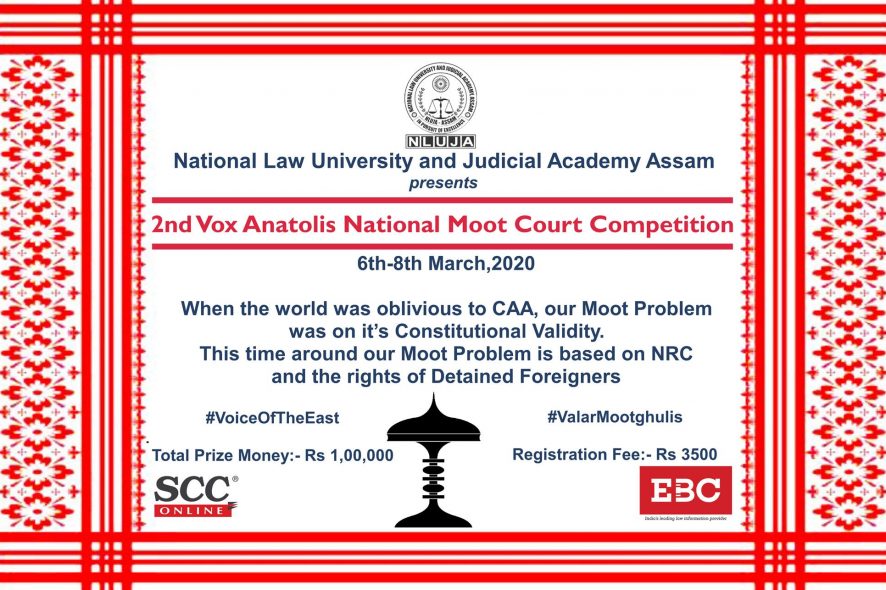ABOUT THE COMPETITION
“Vox Anatolis” means the voice of the east. The National Law University and Judicial Academy Assam had organised the first edition of this Moot Court Competition back in March 2019. Back then, the subject of the Moot was the constitutionality of the Citizenship Amendment Act. When India was oblivion to CAA, we had made it the subject matter of our moot court competition.
This time around the subject of their moot is NRC and the rights of detained foreigners, which is perhaps the next big conundrum that is going to appear in the legal and political horizon of India.
DAY 1- Team Registration and Inaugural Ceremony
Registration: 16:00 PM to 17:00 PM– The Registration starts at 16:00 PM
The following teams registered and will be competing for the Winners Position.
- Llyod Law College, Greater Noida
- Faculty of Law, Maharaja Sayajirao University Baroda
- University Law College, Gauhati University
- Symbiosis Law School, Pune
- School of Law, KIIT
- Chanakya National Law University
- Ram Manohar Lohiya National Law University
- Indian Institute of Legal Studies, Siliguri
- School of Law, Christ University
- West Bengal National University of Juridical Sciences
- Institute of Law, Kurukshetra University
- Amity Law School, Noida
- Gujarat National Law University
- University of Science & Technology, Meghalaya
- Dharmashastra National Law University, Jabalpur
- Marathwada Mitra Mandal’s Shankarrao Chavan Law College, Pune
- KLE Society’s Law College
- Birla School of Law, Birla Global University
- Jindal Global Law School, Sonipat
- Tamil Nadu Dr. Ambedkar Law University, SOEL, Chennai
Inaugural Ceremony:
17:00 PM: The inauguration ceremony started. The chief guest of this ceremony was Senior Advocate Nilay Dutta who is the present Advocate General of the state of Arunachal Pradesh and was a part of the Mudgal Committee, which was formed to probe the 2013 IPL Spot Fixing. The chief guest, Senior Advocate Niloy Datta, along with the Vice Chancellor of National Law University and Judicial Academy, Professor JS Patil and President and Vice President of the Student Bar Council of National Law University and Judicial Academy lighted the lamp and marked the start of the 2nd edition of Vox Anatolis.
17:10 PM: The university anthem was sung by the students of the university.
17:15 PM: The Vice Chancellor, Prof. Dr. JS Patil was called up on stage to address the gathering. He spoke about the recent achievements of the university in the field of Moot Court Competitions and International rankings. He also spoke about Vox Anatolis and how every year the moot court competition addresses an issue which is very pertinent to the North Eastern region of our country.
17:30 PM: Next, the chief guest of the evening, Senior Advocate Nilay Datta was called up on stage. He talked about the culture and secularism which is exhibited throughout the state of Assam. He spoke about the Indian Constitution and how fraternity is one of its important elements. At last he gave a few tips to the participants on how to argue before a court and wished them luck for the next two days.
17:55 PM: Chief guest, Senior. Advocate Nilay Datta, Vice Chancellor, Prof. Dr. JS Patil and all the participating teams clicked a photograph together, which was followed by evening snacks.
18:20 PM: The draw of lots started.
18:30 PM: The Researcher’s Test was conducted.
20:00 PM: Dinner Time!
Day 2
The Preliminary 1
10:45 AM: The briefing of the judges took place and they were explained the Moot proposition in details.
11:15 AM: The Prelims 1st round started in 10 court rooms.
Court Room 1: In court room 1 K.L.E Society of Law was up against Lloyd Law College, the speakers from the petitioner side spoke about the fundamental rights which are guaranteed to citizens as well as non-citizens. They also argued about the vulnerable sections of the society. In response to the contentions presented by the petitioner’s side, the respondent side spoke about the detention process being a temporary provision and the judges were satisfied with the arguments.
Court Room 6: In court room 6 Birla Global University faced off CNLU Patna, the petitioner side was well versed with the facts of the case and argued about the Foreigner’s Act and how it violates basic Fundamental Rights and Human Rights of illegal immigrants as the Moot proposition was on the ongoing NRC issue. They also spoke about the principle of divine intervention and how it is deeply rooted in the English Law. The speakers from the respondent sides argued how Article 21 and 22 were not violated. In rebuttal rounds the respondents could not counter the arguments put forth by the petitioners.
Court Room 8: In court room 8 SOEL Chennai faced Indian Institute of Legal Studies, this was a gruelling session. The counsel from behalf of petitioner side gets into a heated argument with the judge regarding the provisions of citizenship. The bench pulls the trigger on key words and citations mentioned in the respondent’s memorial.
Court Room 2: In court room 2 where Faculty of Law, University of Baroda was up against DNLU Jabalpur, the counsel from the petitioner side was not well versed with the facts of the case and the Judges took advantage of that and confused the counsel. The respondent side mentioned several international conventions and the judges seemed a little unsatisfied with the arguments which were presented by them.
Court Room 10: In court room 10 NUJS Kolkata was up against USTM Meghalaya, the judges grilled the petitioner speaker 1 and seeked clarifications on numerous occasions on the NRC issue. The petitioner side could not prove Locus standi and jurisdiction and the judges seemed unsatisfied. The respondent side too, could not satisfy the judges with their arguments and failed to explain their contentions to the judges.
12:35 PM: The 1st rounds were completed in the respective court rooms and there was a snacks break.
The Preliminary 2
13:30 PM: The Prelims 2nd round commenced.
Court room 3: In court room 3 GNLU Gujarat was up against NUJS Kolkata, both the sides were grilled and the judges noticed that the petitioners lacked basic court etiquettes and were not well versed with the facts of the case. The respondent side too, was grilled by the judges but they got away by mentioning Intelligible differentia and reasonable classification.
Court room 9: In court room 9 where CNLU Patna faced JGLS Sonipat, where the petitioner side could not finish her arguments within the time which was allotted. The respondent side was constantly grilled and were confused. The rebuttals lasted for two minutes and summed up their arguments while attacking the petitioners quite advertly.
Court room 7: In court room 7 University Law College, Guwahati was up against KLE Society of Law, the petitioner were unable to prove maintainability and locus standi. The respondent side was grilled on the violation of Art. 21 of the Constitution. The rebuttal round was well answered by both the teams.
15:00 PM: Lunch was served.
Quarter Finals
16:30 PM: The quarter finalists of the 2nd Edition of Vox Anatolis are:
- Jindal Global Law School
- Amity Law School, Noida
- School of Law, Christ University
- School of Excellence in Law, (TNDALU)Chennai
- Chanakya National Law University, Patna
- West Bengal National University of Juridical Sciences, Kolkata
- Dr. Ram Manohar Lohiya National Law University, Lucknow
- Indian Institute of Legal Studies, Siliguri
16:40 PM: The draw of lots is taking place.
16:45 PM: The quarter final line ups are as follows:
- Amity Law School, Noida v Chanakya National Law University, Patna in Court Room 1.
- School of Law, Christ University v West Bengal National University of Juridical Sciences, Kolkata in Court Room 2.
- Indian Institute of Legal Studies, Siliguri v Jindal Global Law School, Sonipat in Court Room 4.
- Dr. Ram Manohar Lohiya National Law University, Lucknow v School of Excellence in Law, Chennai in Court Room 5.
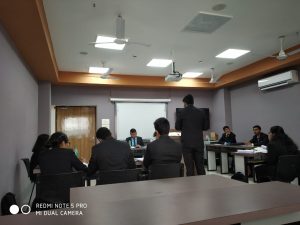
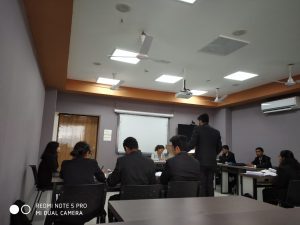
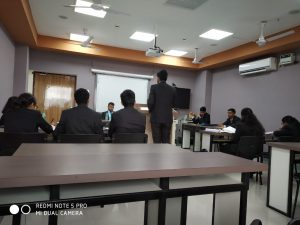
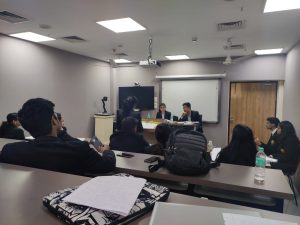
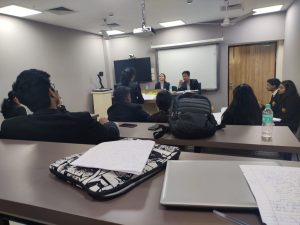
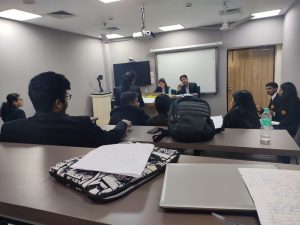
17:00 PM: The quarter finals commenced.
Court room 1: In court room 1, Amity Law School, Noida (Petitioner) was up against Chanakya National Law University Patna (Respondent). It was the longest round of the day! The judges were really interactive and tried to deviate the speakers of both the petitioner as well as the respondent sides from their contentions. The judges had a heated argument with Speaker 2 from the petitioner side as the judges refused to provide a solution to the contentions put forward by the petitioner’s side. The respondents were equally grilled as they could not provide a justification for the violation of Fundamental Rights of the detainees.
Court room 2: In court room 2, School of Law, Christ University (Petitioner) faced off West Bengal National University of Juridical Sciences, Kolkata (Respondent). The entire round was a balanced one. Both the teams were able to argue before the court and explain their contentions properly. The judges looked satisfied. The rebuttals round also went well as both the teams performed really well.
Court room 4: In court room 4 Indian Institute of Legal Studies, Siliguri (Petitioner) was up against Jindal Global Law School, Sonipat (Respondent). The petitioners fell short in submitting the provisions with respect to their submissions. The petitioners began to state the facts and the judges imposed questions on the same. They again and again sought clarifications regarding the maintainability and locus standi issue. The respondents on the other hand were very confident and composed with their oral submissions. They seemed to have a great hold of international provisions and were able to answer the queries of the panel. The petitioners countered the respondent’s arguments in the rebuttal. The respondents were able to satisfy the panellists in the sur rebuttals and thus this marked the end of the oral submissions.
Court room 5: in court room 5 Dr. Ram Manohar Lohiya National Law University, Lucknow (Petitioner) was up against School of Excellence in Law, Chennai (Respondent). The petitioners on the very onset of the round asked for a writ of Habeas Corpus instead of Mandamus. Although they were very fluent with their arguments, they failed to back their own arguments to which the judges sought clarification from the researcher of the team and were disappointed by the researcher. But on the brighter side they managed to put forth all their issues inspite of them being grilled by the bench like the counsel put forward solid arguments like mental trauma faced by the children put in jail at such a young age. The respondents started on a great note who also answered questions raised by the bench when the petitioners was presenting their arguments. The counsel was confident and moved smoothly without deviating from their arguments. Both the counsel and co-counsel were eloquent. They put forward their key points like intelligible differentia. The counsel later put forth amicable arguments in rebuttals.
19:30 PM: The Quarter Finals results are declared.
The Following teams have qualified for the Semi Final Rounds:
- Amity Law School, Noida
- West Bengal National University of Juridical Sciences, Kolkata
- Dr. Ram Manohar Lohiya National Law University, Lucknow
- Jindal Global Law School, Sonipat
Day 3
Semi Finals
11:00 AM : The semi-final line ups are as follows :
1. Jindal Global Law School (P) v. Amity Law School, Noida (R) in Court Room 1
2. Dr. Ram Manohar Lohiya National Law University, Lucknow (P) v. West Bengal National University of Juridical Sciences, Kolkata (R) in Court Room 2
11:30 PM: The semi-final rounds start.
Court Room 1: The first semi-final was between Jindal Law School and Amity Law School, Noida. The Jindal Law School was representing the Petitioner and the Amity Law School was representing the Respondent. This round was judged by Mr. Debajit Das, Mr. Debajit Sinha and Mrs. Rita Das. The counsel for Petitioner starts by acquainting the bench with the facts of the case. Being questioned on the thin line that delineates the validity of NRC from constitutional validity, the counsel struggles to find a hard ground to base his arguments on. Although the counsel started on a bright note with articulate arguments, the counsel now walks on thin glass, as the bench relentlessly continues to question the technicalities of the provisions of NRC. Now extending his arguments to the area of illegal detention, the judges listen with rapt attention. As the counsel puts forth his set of arguments in regards to Violation of Article 21, the judges bring to light insightful intricacies of the said article. The second counsel on behalf of the Petitioner delves into arguments of the second and third issue. Questioning the counter-intuitive nature of the counsel’s arguments concerning Rights of Prisoner, the bench seems visibly inquisitive. Whilst the counsel tries to glide through his arguments, the exasperation of judges is every evident as the basic premise of the counsel’s arguments pertaining to International Law is based on “presumptuous facts.” The courtroom, now dictated by an air of high intensities of seriousness, witnesses the counsel skillfully answer the questions on international treaties and the judges appear to be seemingly convinced. When being questioned gravely by the judges on the relevance of the Principle of Non-Refoulement, the counsel effectuates his argument by citing the Khudiram Chakma case. After intense rounds of questions and answers, the Petitioner side concludes their set of arguments.
The first counsel for the Respondent goes about her set of arguments regarding the maintainability of the petition. After a skein of statements made the counsel on external aggression, the bench poses questions to the counsel about the applicability of the same in this case. The counsel refers to the rationale of the Sarbananda Sonowal v. UOI case; the judges seem satisfied with the answer. The bench sternly questions the counsel on her stance on arbitrary detention. The pleadings in the courtroom take an intense turn as the bench tries to harp upon the technicality of the word “detention”. Throwing light on the pertinent distinction between the deprivation of liberty and the restriction of liberty, the judge raises questions on the provisions of detention. The counsel trying to seek refuge in citations cites the A. K. Gopalan case. However, the judges point to the counsel the discrepancy between the case and the case law used by her and thus, how it cannot be used to substantiate the said case. The second counsel for Respondent moves ahead with her issues that concern intelligible differentia and reasonable nexus, the bench question the crux of the counsel’s contentions. The counsel, now a little dubious, tries to draw a parallel between the arguments proposed by the Respondent and the questions posed. The counsel steps into a grey are as she mentions of paucity of funds which have rendered them helpless in regards to building of detention centres. The judges, percipient and acute while asking questions, now seem to be daunting the counsel. The counsel raised her contentions with regards to the prisoners’ right to livelihood. As it draws close to the end of the round, the judges deliberate in hushed tones.
Court Room 2: The matchup between Dr. Ram Manohar Lohiya National Law University, Lucknow (P) and West Bengal National University of Juridical Sciences, Kolkata (R) was a remarkable display of in-depth legal research. It was judged by a learned bench comprising of Mr. Monojit Biswas, Mr. Angan Baruah and Mr. Ankur Madhia. The speaker from the petitioner side was grilled when they wanted to prove the maintainability of the case. The judges kept on grilling the speaker from the petitioner side on the objective of an impugned order and unconstitutionality of the exercise. Apart from this, the issues of Juvenile Justice Act as well as the separation of family, was discussed by the petitioner side in this round. The speaker from the respondent side spoke about the legal backing of the exercise and tried to draw an analogy between right to citizenship and laws of citizenship. The bench continued grilling the respondent side as well as they laid stress on non-negotiability of Article 21 and referred to the government as incompetent in this ongoing situation. The counsel on the ‘side of government’ requested the bench to strike down or severe the parts of the government order itself, on which the counsel was grilled badly by the judges, the court had multiple giggles coming on this point. The bench demands good reason and calls that they would not go but conjectures and surmises.
15:00 PM: Lunch for Day 2 is served.
15:30 PM: The finalists for the 2nd edition of Vox Anatolis are:
- Jindal Global Law School
- West Bengal National University of Juridical Sciences
Finals
16:00 PM: The Finals Start
The Petitioner ( Jindal Global Law School, Sonipat)
Speaker 1
The Counsel from the Petitioner side was very confident and was very well versed with the facts of the case. The Counsel started by proving his Locus Standi to the judges on the bench. The Counsel seemed well versed with the facts of the case and supported his arguments with a lots of Case laws. He also discussed on Constructive Res Judicata. The Counsel also discussed the validity of the NRC and questioned whether NRC is in violation of Fundamental rights of the Citizens. He also discussed the test of proportionality. He argued that the detention must be justified under the Foreigners Act. But in this case the detention is not justified and is depriving the fundamental rights. The counsel from the Petitioner also questioned the Right to work, health and education which the peoples in the detention center deserves. The Counsel was able to answer all the questions which was asked by the Judges. The Counsel had a good grasp of law and the matter at hand was being able to tackle every question the judges inquired.
Speaker 2
The Co-Counsel from the Petitioner side was one of the best speakers of the competition and had a very good hold of language. The co-counsel was very well versed with the matter at hand and had abundant case laws to support his every arguments. The co-counsel dealt with the question whether the home ministry order is in violation of Article 21.
The co-counsel from the Petitioner side talked about Safekeeping in custody where it is expected that the administration keep the detainees in proper safekeeping while in custody. He argued that safekeeping in custody also includes the right to family unity and the taking away of the family unity is in contravention of the safekeeping in custody rule.
The co-counsel also talked about various International Laws and International Convention which the state has ratified/not ratified but is bound under it because of the law falling under customary international law. He also talked about non-refoulement as it falls under customary international law. The co-counsel also discussed on the rights of the children in the detention centres and the rights of health and education in the detention centres.
As it was already mentioned that the co-counsel was one of the best speakers with a good knowledge of law. He was able to cleverly tackle each and every question asked by the judge. Even after the judge trying to confuse the co-counsel. The co-counsel sticked to his point and was not confused.
16:50 PM: The Petitioners dictates the Prayer. And the judges seemed to be satisfied with the prayer.
The Respondent (NUJS Kolkata)
17:00 PM: The Respondent side proceeds with their set of arguments.
Speaker 1
The Counsel from the Respondent side was a very good speaker and had a very good understanding of law. The Counsel was confident and was able to easily tackle any question which was asked to him by the Judges. He argued that the NRC is not unconstitution and the Government is competent to introduce NRC. He justified his arguments with different case laws. The Counsel also tried to explain the difference between the migrant and the illegal immigrants. The Counsel also argued that non-refoulement is for the refugees but in the present case the matter is in regards to the illegal immigrants.
Speaker 2
The co-counsel from the Respondent discussed on the legality and constitutionality of the matter. He argued that there is no other alternative choice and the rights of the citizen is more important than the rights of the illegal immigrants. He also argued that a Xenophobic attitude towards this illegal immigrants is developing. Therefore, a deportation house ensures the safety of the immigrants. The co-counsel also cited some international cases in order to justify the need for the detention centres.
5:20: The Respondents dictates the Prayer. But Senior Advocate inquired why the Respondents think that the PIL is not maintainable. But the doubt is immediately cleared by the counsel of the respondents.
5:25: Rebuttals
5:30: End of the Finals
The Valedictory Ceremony
18:15 PM: The Chief Guest Justice Ujjwal Bhuyan, Judge, Bombay High Court ,with the other guests accompanied by the VC arrive in the Seminar hall.
18: 20 PM: The Vice Chancellor felicitated the Chief Guest..
18:23 PM: The VC was called on stage to address the gathering. He talked about the objective of taking justice to needy. VC introduced the gathering to ‘Parichay’, an initiative of various NLUs to help common people over NRC issues. He spoke about the importance of events like these in bringing the issues of North east to the whole of the country and global community. He referred the teams and students present as the ‘Ambassadors of peace and Justice’. The VC thanked all the guests and luminaries that helped in successful completion of the competition.
18:34 PM: The Chief Guest was called on stage, He complimented the teams who participated and talked about the Mooting culture being the part of curriculum, He emphasised on the need of incorporating non-NLUs into this culture. He talked about the necessity of improvement of speaking skills of bar especially in District bars. He pointed out that experience of mooting is more important than winning the competition.
18:40 PM: Prize distribution begins
The Winners:
Best Memorial: Amity Law School Noida
Best Researcher: Ashutosh Patil, RMLNLU
Best Speaker: Ghazal Ghay, Amity Law School Noida
Best Team: WBNUJS
Runners-Up- Jindal Global Law School
18:45 PM: Vote of thanks by Student Bar Council President.


